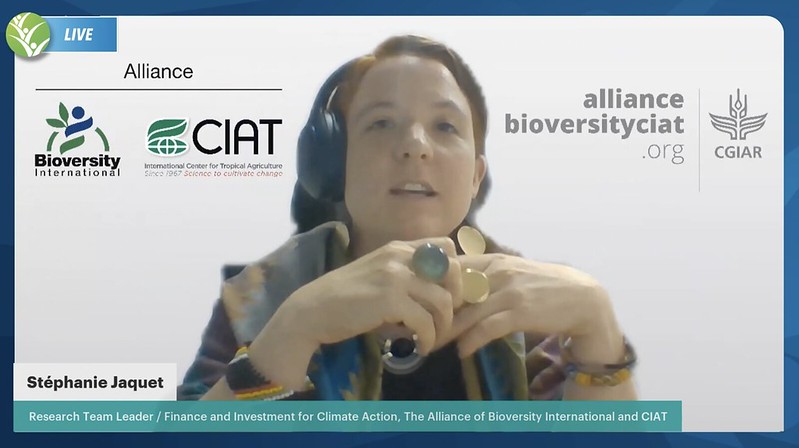For decades, Germany has been a reliable partner of international agricultural research to support sustainable agrifood systems transformation. The German Federal Ministry for Economic Cooperation and Development (BMZ) recently launched its new strategy Sustainable Agri-Food Systems: A World Without Hunger. International agricultural research is seen as an integral source of innovation in the three action areas rural development, food security and agriculture. CGIAR, under its One CGIAR unified research framework, has combined agricultural research and innovations into a new portfolio of initiatives, informing a growing number of policies and impacting more livelihoods than ever before.
A Feb. 22 policy seminar sponsored by BMZ, CGIAR, IFPRI and supported by GIZ, explored joint research-for-development priorities for Germany-CGIAR collaboration, particularly given growing, linked crises surrounding food insecurity, nutrition, and climate change.
For research to inform practice and policy, both need to be closely aligned. Only with a deep involvement at country level can research be part of national policy discussions. There are key moments of opportunity in decision making, and research needs to be agile and targeted to capitalize on such moments in order to provide evidence-based advice when it is needed.
The One CGIAR reforms are important to keep up with current global challenges and to gauge the impacts of research innovations, said Dirk Meyer, BMZ Director General of Global Health, Economy, Trade, and Rural Development. “We strongly believe that a world without hunger within the planetary boundaries is possible,” he said. “To achieve this, we must ensure a strong interplay between research and the policy level.”
CGIAR must embrace the interconnected nature of land, food, and water systems to work successfully towards a world without hunger, said Kundhavi Kadiresan, CGIAR System Organization Managing Director, Global Engagement and Innovation. Three pathways are crucial to create impact at scale, she said: Science outputs, capacity development and the policy level.
Research plays an important role in refining and improving practice and policy responses, which was illustrated with two examples of collaboration between German development cooperation and CGIAR. IFPRI Senior Research Fellow Clemens Breisinger explained how research helped in evaluating cash transfers and food subsidy programs in low-income countries. This contributed to improving dietary diversity and nutrition, which are key to BMZ’s strategic direction. Strong research collaborations further informed an expansion of the World Bank Cash for Nutrition program in Yemen, helped to better target bread subsidies in Sudan, and aided in a long term institutional and capacity building project in Ethiopia carried out with the Agricultural Transformation Agency (ATA).
Insights from climate risk analysis have helped in making programmatic decisions at GIZ Green Innovation Centers, explained Stephanie Jaquet, research team leader at the Alliance of Bioversity International and CIAT, and Björn Hecht, component manager of GIZ in Mozambique. For example, projected climate-driven changes in the suitability of pigeon pea and baobab led to changes in recommended innovations, such as adapted irrigation, processing, and storage technologies.
The panel discussion focused on several key questions: What are the main ingredients and opportunities for successful collaboration between science and policy? Where do the main obstacles lie to making policy and development practice more evidence-based? What are the concrete next steps for enhancing collaboration between One CGIAR and German development efforts?
Key takeaway messages that emerged from the panel discussion included:
- Building institutions to translate research recommendations into real policies and action is essential, said Khalid Bomba, Managing Director of the Agrifood Transformation Agency Support Center.
- A better understanding of decision-making processes to identify needs and entry points for research is important, stressed Eike Lüdeling, Professor of Horticultural Sciences at the University of Bonn..
- Close collaboration with uptake partners is a key priority, along with capacity building of local institutions to ensure evidence is mainstreamed, for instance in extension materials, emphasized Claudia Ringler, Deputy Director of IFPRI’s Environment and Production Technology Division.
- Research should consider the real world issues of policymakers, and focus on underlying interests and motivations in decision making, argued Lennart Woltering, CIM Integrated Expert at CIMMYT and member of the GIZ Scaling Taskforce.
Strong, long-term collaborations are key to implementing innovations at scale, said BMZ Senior Policy Officer Felicitas Röhrig. “We must leverage the momentum and align opportunities arising from Germany’s new strategy and the One CGIAR reform to enhance policy outcomes from international agricultural research,” she said.
Birthe Paul is an advisor on sustainable agrifood systems in the GIZ sector project on agriculture.







